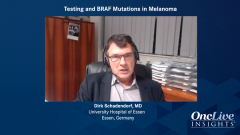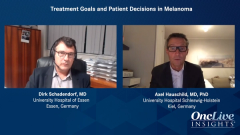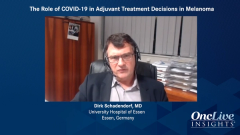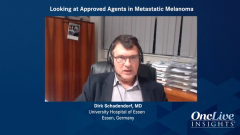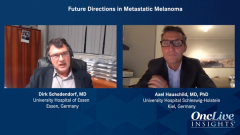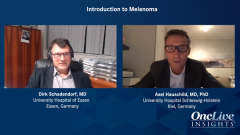
Molecular Testing in Metastatic Melanoma
Episodes in this series

Axel Hauschild, MD, PhD: Dirk, we want to discuss metastatic melanoma, stage IV now. I have just one question, and I hope you can shortly repeat what you are doing in your center University Hospital of Essen. Are you doing another molecular testing as a routine, or is it just an experimental setting in your translational research program to go for another molecular test once a patient has progressive disease?
Dirk Schadendorf, MD: If we have BRAF testing available, that is sufficient. Nevertheless, we have a large translational program taking blood and doing molecular profiling of these patients as part of the work-up. This has no clinical consequence if we have a known BRAF mutational status.
Axel Hauschild, MD, PhD: I am sure you have a so-called molecular tumor board in your center.
Dirk Schadendorf, MD: Yes.
Axel Hauschild, MD, PhD: If the molecular tumor board finds added mutations, are they directing to a kind of treatment that is off label? Are you applying with the insurance companies for these patients?
Dirk Schadendorf, MD: We have various clinical studies that are open, for example, the NRAS-mutated melanomas and some other mutational variants. That is what we do, yes, but we are not applying for rare tumor mutations to insurance companies. That is not what we do.
Axel Hauschild, MD, PhD: OK, good. The question now is on the distinction of BRAF-directed treatment in stage IV and treatment with immune checkpoint inhibitors. Will you tell us, in the first place, what is the German guideline for first-line treatment? Is there a clear preference?
Dirk Schadendorf, MD: Yes. As you know, Axel, since you are part of the panel, it is clear that in the first-line setting, the patient should get either targeted therapy if they are BRAF-mutated or a checkpoint blockade. The checkpoint blockade could be PD-1 monotherapy or a combination with ipilimumab. There is no preference among these 3 different options, but there is a clear statement that they should get one of these 3 innovative treatments, and clinical studies should be considered.
Axel Hauschild, MD, PhD: Yesterday, I was talking in a seminar about the new ESMO [European Society for Medical Oncology] clinical practice guidelines, and I was really surprised. There is a paragraph saying that it is difficult to draw an algorithm for stage IV first-, second-, and third-line treatment in the absence of direct comparisons of targeted therapies and immune checkpoint inhibitors. But then found the algorithm that is clearly saying that BRAF-directed treatment should only be given if patients are not fit for toxicity for immune checkpoint inhibitors. The clear preference is immune checkpoint inhibition over BRAF/MEK inhibitors.
Do you think it is worthwhile to change all the German guidelines now that the ESMO clinical practice guidelines are out?
Dirk Schadendorf, MD: One must have in mind how guidelines evolve or how they are generated. For example, the Australian and the German guidelines are clearly evidence-based and are considering all the evidence, like clinical studies that have been published and peer reviewed, and they have drawn conclusions from that. They are not considering personal opinions on the abstracts, for example. This guideline process also includes, like the multidisciplinary tumor boards, different perspectives, including radiation, oncology, surgeons, and so on. It is not a mix of a selected small number of people who have personal opinions that are given. The NCCN [National Comprehensive Cancer Network] is criticized a bit in that direction, but the ESMO guidelines are also driven by a few figures in the same direction, yes.
Axel Hauschild, MD, PhD: OK. What you are saying to us in a few words is that it is more eminence- than evidence-based guidelines, correct?
Dirk Schadendorf, MD: Yes.
Transcript Edited for Clarity


